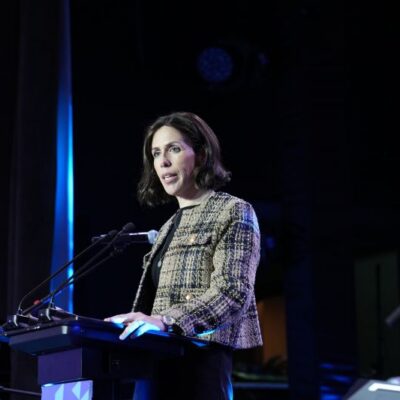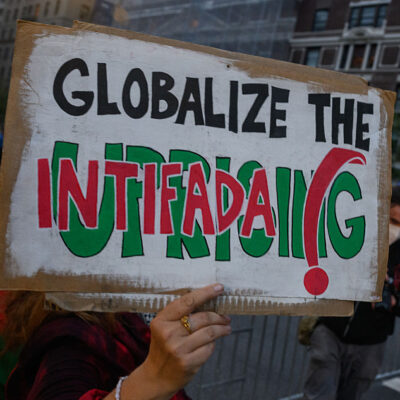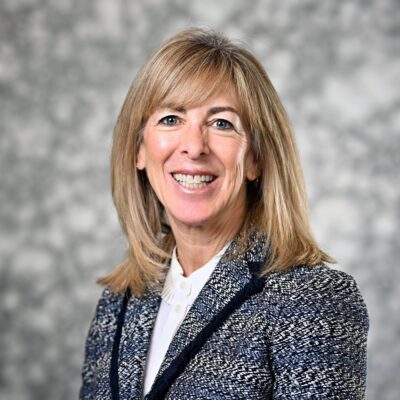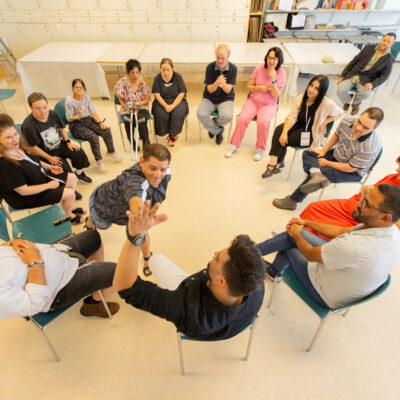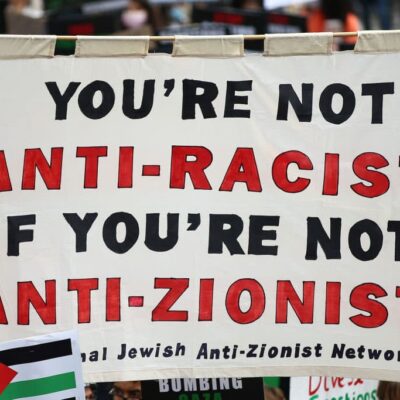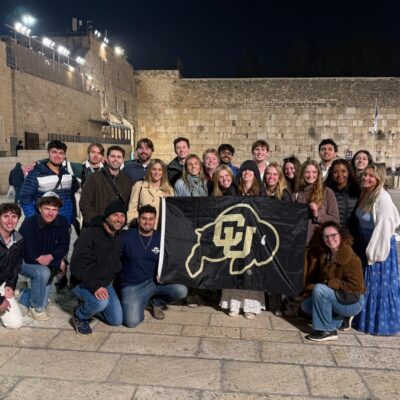Q&A
Brooklyn-based La’Aretz Foundation looks to give $2,500 directly to victims of Bat Yam missile attack
On the belief that the recipients know best, the group has raised more than $1 million for the initiative so far, but legacy organizations are hesitant

Yair Palti/Anadolu via Getty Images
A view of the damage is seen after a missile launched from Iran on June 15, 2025, struck the Israeli city of Bat Yam, south of Tel Aviv, on June 20, 2025.
When an Iranian missile containing several hundred pounds of explosive slammed into a residential building in the central Israeli city of Bat Yam, it destroyed not only that building but its shockwaves also sheared off the walls and windows of surrounding apartments and storefronts. Nine people were killed in the blast, and dozens more were injured.
The seaside Bat Yam, located just south of Jaffa, was already one of Israel’s poorest cities, ranking in the bottom-most tier of the Israeli Central Bureau of Statistics’ latest quality-of-life assessment.
The Iranian attack in Bat Yam damaged dozens of buildings, rendering many of them unlivable, forcing more than 2,000 people to move into hotels, temporary apartments or with family while their homes are repaired. A number of initiatives have sprung up to assist these evacuees, and the thousands of other people displaced by the hundreds of Iranian ballistic missiles that rained down on Israel last month. One of these was by the Brooklyn-based La’Aretz Foundation, which is run by husband-and-wife team Mike and Shelly Pitman, who serve as president and executive director, respectively. La’Aretz (literally “to the land”) set out to provide $2,500 directly to 500 Bat Yam families affected by the attack. So far, the organization has raised more than $1 million for the effort and has distributed the direct funds to some 250 households.
Earlier this week, eJewishPhilanthropy spoke with the Pitmans about their unorthodox direct cash payment model and their struggles to get other aid organizations on board.
The interview has been lightly edited for clarity.
Judah Ari Gross: Why did you decide to undertake this specific project of direct donations to those affected by the Iranian missile strike in Bat Yam? Why not partner with existing organizations who are operating on the ground?
Shelly Pitman: First of all, La’aretz since Oct. 7 has focused on direct, immediate impact to people affected by conflicts in Israel. After the Iran attack, we found that Bat Yam was hit the hardest. Almost 2,000 people were evacuated, and the neighborhood that was hit is a very low-income neighborhood from the start. There is a big population of new immigrants, of Russian speakers, of elderly people. It is a very poor area. So we decided to adopt it. Obviously, the ideal situation was to open [the direct donations] to everyone who has been evacuated, but because of the emergency need, we decided for now just to adopt the place that needed it the most, and it’s Bat Yam.
We started our campaign with the agenda of supporting 500 evacuated households with $2,500 each. I’m very happy to say that 10 days later, we have already achieved 76% of the campaign, which is over $1 million. And this week, already 250 households have received the support. So it’s amazing.
Why not other Jewish organizations? I think all of the organizations are doing a beautiful job, but — as an Israeli who is on the ground — the people in Bat Yam are not [directly] receiving anything from anyone else. [Ed. note: The Jewish Agency for Israel recently launched a fund aimed at providing grants directly to victims of the Iranian attacks, though its conditions are somewhat stricter than La’Aretz’s and it has taken more time to get up and running.]
We really believe in direct cash donations because I come from a low-income family. My parents had made aliyah, and I know how sometimes there are organizations that are coming and trying to give clothes or trying to offer therapy, but when someone is going through such a hard period, they want their dignity to buy what they think they need. Sometimes the donated clothes are not the right size. Or the therapy is in a specific hour, in a specific city, and you have five screaming kids and just scheduling it gives you a headache, so you give up this benefit.
So I believe in cash donation. I believe in dignity to those families who have lost everything to decide on their own what they need to buy. And it’s a very unique approach. And we’re very happy that many philanthropists that used to support all the big organizations believe in our mission, believe in what we’re doing and are joining this effort.
JAG: How do you get to the families? Are you working with the municipality? With the Welfare Ministry? What’s the mechanism that you are using to find people who have been evacuated or whose homes have been damaged?
SP: We work with municipalities, directly with the welfare departments, with social workers. We do it on the city level because the social workers and the welfare department know their citizens the best. And for example, this week we had people on the ground in evacuated hotels giving out prepaid credit cards with $2,500. And the social workers were there helping with the paperwork and everything. So we work only with social workers. They identify the people, and we go over the list. We never give the funds through a third party. We give it directly to the people they identified.
JAG: Are you working with other organizations on the ground?
SP: Our approach of cash donations is unique. We haven’t received much support from big federations or other foundations for what we do. We have received a lot of support from private philanthropists. There have so far been two big donations for this campaign, one from a private donor who gave $600,000 right away, the day of the attack. The other is from a private foundation, who also doesn’t want to share their name, who gave $200,000.
JAG: You mentioned that you were hoping to expand this to victims at other impact sites as well. Do you have any specific plans for that or timelines?
MP: Maybe I can add something to that. We believe in focusing on one thing at a time and doing it perfectly. In Bat Yam, there is an urgent need. Of course, there are other cities as well: Tel Aviv got hit, places in the north, in the south, in Petah Tikva. Hopefully, we can get to all of them. But overall, I want to talk about the foundation that the goal is to be pure. That means we didn’t do a crazy campaign to raise money. We’re starting very small. We donate directly to people. We don’t use any middlemen. We don’t pay fees to anybody. We want as close to 100% as possible to go straight to the people.
Then a donor can know [specific recipients] and really have a connection with them. And I think that by doing that, they just keep going and do it over and over and over again. We have an amazing donor, who over the past year and a half, every few months, asks us, “What are the needs?” We tell her, and she helps us fulfill those needs. … And this is what we find in people: the love to give and the love to help people in need, especially in Israel.
JAG: Have you tried to reach out to some of the larger organizations to collaborate?
SP: We reached out to all the big federations, you can imagine, and we received a negative response because they don’t believe in cash donations. Their projects have to be tracked, which I respect, so they need a specific thing — a building or specific project or things like this — and a cash donation, it’s very hard to track.
JAG: I imagine that’s because they want to be sure that the funds they’ve raised are being used in the most effective way.
SP: The process we developed is that all the people are identified by professional social workers on the ground who work in municipalities or in the hospitals or the army. We don’t receive inquiries. We don’t need to research the background of the family too much because they have come to us after they’ve already been verified by a social worker. After this, we do our own verification for their needs, and the donation goes straight from us to the person. And our reporting is very clear. So we report back to donors exactly with the amount, the date, what the background of the family, what their needs were, how much we provided them and how we identified the families.
So our donors are very happy with this process. It’s a respectful, easy process for people that are going through so much in Israel. And the fact that people come to us from a professional social worker on the ground gives a lot of security to the donor.
JAG: What’s the mechanism for getting the funds from the U.S. to Israel?
MP: Basically, after we verify all of these things with the social workers, our staff calls to verify the account information in Israel, and then we wire it. Every week, we wire funds straight to the account.
I can tell you, I think it’s the best job ever to be on the phone with [recipients] because it’s very emotional. They really get excited, and this is what I think drives people in our foundation. It is an unbelievable feeling to give.

 Add EJP on Google
Add EJP on Google








